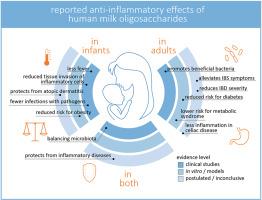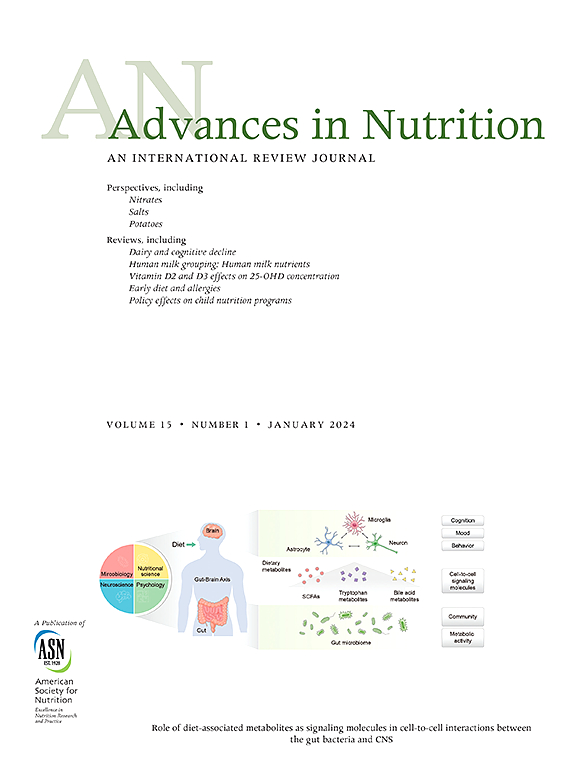Human Milk Oligosaccharides Modulating Inflammation in Infants, Adults, and Older Individuals—From Concepts to Applications
IF 9.2
1区 医学
Q1 NUTRITION & DIETETICS
引用次数: 0
Abstract
The increasing global prevalence of inflammatory diseases, such as ulcerative colitis and irritable bowel syndrome, represents a challenging task for healthcare systems. Several approaches to disease management target the intestinal microbiome, which plays a key role in health and disease. One promising approach is modulating the microbiome using human milk oligosaccharides (HMOs). Originating from human milk, HMOs are indigestible carbohydrates that act in a host-optimized prebiotic fashion by providing an energy source for health-promoting intestinal bacteria and exhibiting systemic effects. Commercial products supporting infant health and development have been the primary fields of HMO application. Advancements in the large-scale production of HMOs through bioengineering and precision fermentation have led to evaluation of their potential for managing inflammatory diseases. Several in vitro studies and observations on model systems have been clinically validated in infants, resulting in a large body of evidence supporting the safety and efficacy of HMOs in inflammatory disorders. Although novel approaches seek to explore interventions in adults, the primary goal for the future is to provide cost-efficient, safe, and reliable healthcare compounds across all age groups.

人乳寡糖调节婴儿、成人和老年人的炎症——从概念到应用。
溃疡性结肠炎和肠易激综合征等炎症性疾病的全球患病率不断上升,这对卫生保健系统来说是一项具有挑战性的任务。几种疾病管理方法针对肠道微生物群,它在健康和疾病中起着关键作用。一种有前景的方法是使用人乳寡糖(HMOs)调节微生物组。源自人乳的HMOs是一种不易消化的碳水化合物,通过为促进健康的肠道细菌提供能量来源并表现出全身效应,从而以宿主优化的益生元方式发挥作用。支持婴儿健康和发育的商业产品一直是卫生组织应用的主要领域。通过生物工程和精密发酵大规模生产HMOs的进展导致了对其治疗炎症性疾病的潜力的评估。一些体外研究和对模型系统的观察已经在婴儿中得到了临床验证,从而产生了大量证据支持HMOs治疗炎症性疾病的安全性和有效性。尽管新方法寻求探索成人干预措施,但未来的主要目标是为所有年龄组提供具有成本效益、安全和可靠的保健化合物。
本文章由计算机程序翻译,如有差异,请以英文原文为准。
求助全文
约1分钟内获得全文
求助全文
来源期刊

Advances in Nutrition
医学-营养学
CiteScore
17.40
自引率
2.20%
发文量
117
审稿时长
56 days
期刊介绍:
Advances in Nutrition (AN/Adv Nutr) publishes focused reviews on pivotal findings and recent research across all domains relevant to nutritional scientists and biomedical researchers. This encompasses nutrition-related research spanning biochemical, molecular, and genetic studies using experimental animal models, domestic animals, and human subjects. The journal also emphasizes clinical nutrition, epidemiology and public health, and nutrition education. Review articles concentrate on recent progress rather than broad historical developments.
In addition to review articles, AN includes Perspectives, Letters to the Editor, and supplements. Supplement proposals require pre-approval by the editor before submission. The journal features reports and position papers from the American Society for Nutrition, summaries of major government and foundation reports, and Nutrient Information briefs providing crucial details about dietary requirements, food sources, deficiencies, and other essential nutrient information. All submissions with scientific content undergo peer review by the Editors or their designees prior to acceptance for publication.
 求助内容:
求助内容: 应助结果提醒方式:
应助结果提醒方式:


